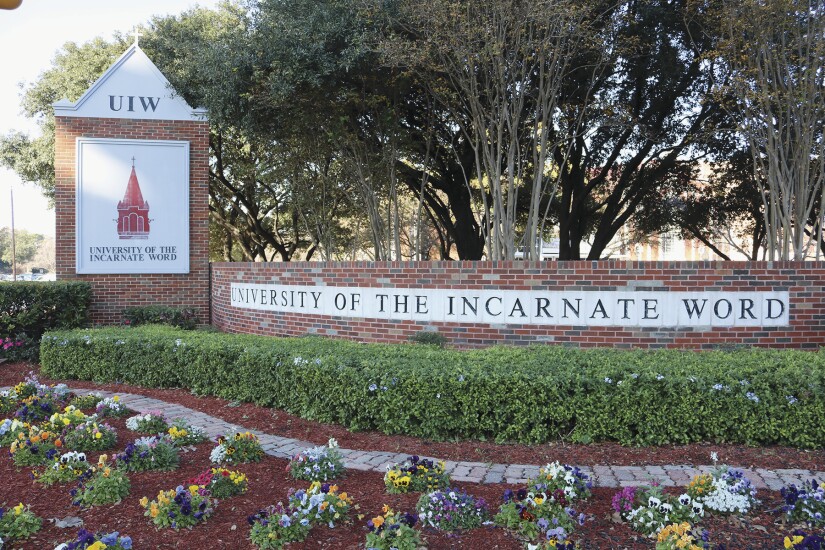Our annual schools listing, listed in alphabetical order, is drawn from a Financial Planning survey of colleges and universities that offer CFP Board-registered degree programs. Images courtesy of the schools.
ALBERTUS MAGNUS COLLEGE
CFP Board-registered programs: B.S. in finance with a concentration in personal financial planning
Enrollment: 6
Faculty: 1 full-time; 3 adjunct
Student-to-faculty ratio: 14:1 school-wide
Tuition: Accelerated bachelor’s degree program: $1,530 per three-credit course; traditional bachelor’s program: $30,650 per year
FPA Student Chapter: None
Overview: The program is designed for students looking to enter the growing fields of corporate finance and personal financial planning. Students learn a strong foundation of finance principles and business applications to prepare for a variety of careers in the financial services field. Requisite coursework satisfies the educational requirement for the CFP exam.

ALFRED STATE COLLEGE
CFP Board-registered programs: B.B.A. in financial planning
Enrollment: 50
Faculty: 3
Student-to-faculty ratio: Approximately 16:1
Tuition: $6,470 per year for New York residents; $16,320 per year for nonresidents
FPA Student Chapter: Yes
Overview: Students take nine financial planning classes in addition to a semester-long internship with a planning firm. Students regularly attend meetings and conferences through the FPA student chapter. At the end of the program, all graduating students will have met the requirements to sit for the CFP test.
ANGELO STATE UNIVERSITY
CFP Board-registered programs: B.B.A. in finance with concentration in personal financial planning
Enrollment: Approximately 30
Faculty: 3 full-time, 1 adjunct
Student-to-faculty ratio: Approximately 12-15 students per class
Tuition: Determined by number of courses taken: approximately $1,200 per course for Texas residents; approximately $2,300 per course for nonresidents
FPA Student Chapter: None
Overview: Angelo State University offers a traditional on-campus four-year bachelor’s degree with a major in finance.
BALL STATE UNIVERSITY
CFP Board-registered programs: Financial planning minor
Enrollment: 70-80
Faculty: 8
Student-to-faculty ratio: 15-1
Tuition: $7,794 for 12-18 credits per semester for Indiana residents; $23,962 for 12-18 credits per semester for nonresidents
FPA Student Chapter: None
Overview: Ball State was recently approved by the CFP Board to offer coursework to meet exam prerequisites.
BENTLEY UNIVERSITY
CFP Board-registered programs: M.S. in financial planning, M.S. in taxation
Enrollment: 200
Faculty: 8 full-time, 15 adjunct
Student-to-faculty ratio: N/A
Tuition: $4,445 per three-credit course
FPA Student Chapter: None
Overview: All courses are offered on a synchronous hybrid basis where courses are offered live on campus or simultaneously over the internet.
BERKELEY COLLEGE
CFP Board-registered programs: B.B.A. in financial services
Enrollment: 106
Faculty: 2 full-time, 2 part-time
Student-to-faculty ratio: 10:1
Tuition: $11,550 per semester. Most students qualify for scholarship assistance
FPA Student Chapter: None
Overview: Courses are offered in a variety of formats: on-site, online and blended. The Center for Academic Success supports students by providing individual tutoring.
BOWLING GREEN STATE UNIVERSITY
CFP Board-registered programs: B.S.B.A. in finance with concentration in financial planning
Enrollment: 19,320 universitywide
Faculty: 800 universitywide
Student-to-faculty ratio: 20:1 universitywide
Tuition: $4,548 per semester for Ohio residents; $8,316 for nonresidents
FPA Student Chapter: None
Overview: The financial planning concentration requires eight courses in addition to the general B.S.B.A. requirements.
BRYANT UNIVERSITY
CFP Board-registered programs: B.A. in business with financial planning track
Enrollment: 25
Faculty: 10
Student-to-faculty ratio: Approximately 14:1
Tuition: $41,700 per year
FPA Student Chapter: Yes
Overview: The program is supported by Bryant’s extensive alumni network, providing students with mentoring, internship and employment opportunities, according to lecturer Mara Derderian.

CALIFORNIA LUTHERAN UNIVERSITY
CFP Board-registered programs: M.B.A. in financial planning, M.S. in financial planning
Enrollment: 83
Faculty: 2 full-time; 1 part-time; 14 adjunct
Student-to-faculty ratio: 5:1
Tuition: $2,460 per three-unit course
FPA Student Chapter: None
Overview: Courses are available both online and on-site. Students can choose between two courses of study: One focuses on preparing students for the CFP exam, the other is for those who are already CFPs, offering advanced technical acumen and interdisciplinary courses, according to program manager Cynthia Grether.
CALIFORNIA STATE UNIVERSITY, FULLERTON
CFP Board-registered programs: B.A. in business administration with a concentration in finance and a financial planning emphasis
Enrollment: Approximately 50
Faculty: 16
Student-to-faculty ratio: 3:1
Tuition: $2,871 per semester for California residents; $8,811 for nonresidents. Most students qualify for scholarships through the Mihaylo College’s Center for Insurance Studies
FPA Student Chapter: Yes
Overview: The program is housed in the department of finance at the Mihaylo College of Business, the largest AACSB-accredited business school on the West Coast, according to program leader David Nanigian.

CALIFORNIA STATE UNIVERSITY, NORTHRIDGE
CFP Board-registered programs: B.S. in finance with a financial planning option
Enrollment: 70
Faculty: 6 full-time, 2 adjunct
Student-to-faculty ratio: 20:1
Tuition: $3,291 per semester for California residents; $6,639 for nonresidents
FPA Student Chapter: Yes
Overview: The program offers regular networking opportunities for students and partners with the Volunteer Income Tax Assistant Program on campus to offer planning advice and assist with tax preparation for low-income families and individuals.
CALIFORNIA STATE UNIVERSITY, SACRAMENTO
CFP Board-registered programs: B.S.B.A. with finance concentration and a financial planning track
Enrollment: 64
Faculty: 9 full-time, 4 part-time
Student-to-faculty ratio: 30:1 in upper division courses
Tuition: $3,450 per semester (6.1 or more units) for California residents; $372 per unit plus registration tuition fees and mandatory campus fees for nonresidents
FPA Student Chapter: Yes
Overview: The program receives great support from the local financial services community — providing students with career opportunities, mentorship, scholarships and networking events, according to associate professor Eric Lin. The student FPA chapter participates in monthly meetings and events with the local FPA chapter.
CENTRAL MICHIGAN UNIVERSITY
CFP Board-registered programs: B.S.B.A. in personal financial planning
Enrollment: 36
Faculty: 5
Student-to-faculty ratio: 20:1
Tuition: $417 per credit
FPA Student Chapter: Yes
Overview: The school has a career fair dedicated to financial planning students, featuring more than 20 companies spring and fall.
CENTRAL WASHINGTON UNIVERSITY
CFP Board-registered programs: B.S.B.A. with personal financial planning specialization, B.S. in personal financial planning
Enrollment: 12
Faculty: 1 full-time; 2 adjunct. Courses are also offered by accounting and finance faculty
Student-to-faculty ratio: 12:1
Tuition: $2,012 per quarter; $6,036 overall
FPA Student Chapter: None
Overview: Both degrees provide graduates with eligibility for the CFP exam and incorporate courses in counseling, technology and industry internships.
CLARION UNIVERSITY OF PENNSYLVANIA
CFP Board-registered programs: B.S.B.A. in finance with personal financial planning track
Enrollment: 29
Faculty: 2
Student-to-faculty ratio: 15:1
Tuition: $3,530 per semester
FPA Student Chapter: None
Overview: The personal financial planning program is a major within the traditional four-year undergraduate B.S.B.A. degree. The major area of study includes 24 credit hours of specific junior- and senior-level major-specific classes.
CLARK ATLANTA UNIVERSITY
CFP Board-registered programs: B.A. in finance and financial planning, financial planning minor
Enrollment: Less than 100
Faculty: 5
Student-to-faculty ratio: 8:1
Tuition: $10,238 for 12-18 credit hours
FPA Student Chapter: Yes
Overview: A historically black university, CAU is one of three schools at the Atlanta University Center, along with Spelman College and Morehouse College. Students can take classes on any campus. The financial planning program currently has a 100% graduate placement rate.
CLEMSON UNIVERSITY
CFP Board-registered programs: B.S. in financial management with a concentration in financial planning
Enrollment: 64
Faculty: 11 full-time, 4 adjunct
Student-to-faculty ratio: 4:1
Tuition: $7,159 per semester for South Carolina residents; $17,100 per semester for nonresidents
FPA Student Chapter: In process
Overview: The program places a heavy emphasis on bridging academic knowledge with hands-on training and professional development, according to lecturer and coordinator Josh Harris. Many of the faculty members bring dozens of years of financial planning and investment management experience to the classroom.

COLLEGE OF SAINT ROSE
CFP Board-registered programs: B.S. in financial planning, B.S.B.A. with a concentration in financial planning, undergraduate minor in financial planning
Enrollment: 20
Faculty: 3 full-time, 4 adjunct in financial planning curriculum
Student-to-faculty ratio: 14:1 collegewide
Tuition: $30,546 per year for undergraduates; $799 per graduate credit
FPA Student Chapter: No
Overview: Beyond the foundational knowledge of the financial planning program, students pursuing financial planning majors are strongly encouraged to develop a focus in accounting and taxation, and/or finance and marketing.
COLORADO STATE UNIVERSITY
CFP Board-registered programs: B.S.B.A., financial planning concentration
Enrollment: Approximately 60
Faculty: 10 full-time, 2 adjunct
Student-to-faculty ratio: 26:1
Tuition: $11,632 per year for Colorado residents; $29,140 per year for nonresidents
FPA Student Chapter: None
Overview: The program partners with the FPA of Colorado — teams of students are matched with practitioners for mentorship, according to program director John Hopkins. Students also volunteer at the Denver Financial Planning Day event.

CREIGHTON UNIVERSITY
CFP Board-registered programs: B.S.B.A. with a concentration in financial planning, M.B.A. with an emphasis in professional financial planning
Enrollment: Approximately 1,000 in the Heider College of Business
Faculty: 6 full-time, 6 adjunct
Student-to-faculty ratio: 15:1
Tuition: Varies by program and delivery
FPA Student Chapter: Yes
Overview: Creighton incorporates real world experience, case studies and critical thinking skills into the financial planning program, according to program director Edward Horwitz. “There is an emphasis on understanding and considering the qualitative aspects of client relationships woven throughout our financial planning curriculum,” he says.
DAVENPORT UNIVERSITY
CFP Board-registered programs: B.B.A. in finance with a specialty in financial planning
Enrollment: 24
Faculty: 2 full-time on campus, 1 full-time online, 4 adjunct
Student-to-faculty ratio: 12:1
Tuition: $9,960 per semester for 15 credit hours
FPA Student Chapter: None
Overview: Many courses are taught by financial planning experts in the field. The Morningstar Direct database is an integral part of the program; students receive certification from Morningstar upon completion of training to use the database and cloud.
DELAWARE STATE UNIVERSITY
CFP Board-registered programs: B.B.A. in finance with a minor in financial planning
Enrollment: 15
Faculty: 3
Student-to-faculty ratio: 5:1
Tuition: $7,352 for Delaware residents; $18,138 for nonresidents
FPA Student Chapter: Yes
Overview: The financial planning minor is open to students from all fields of study, according to program director Nandita Das. It is the second Historically Black University to offer a CFP-board financial planning minor in a business college.
DeSALES UNIVERSITY
CFP Board-registered programs: B.S. in finance with financial planning track
Enrollment: 14
Faculty: 2 full-time, 11 adjuncts
Student-to-faculty ratio: 14:1
Tuition: $474 per credit
FPA Student Chapter: Yes
Overview: The bachelor’s degree is offered through the school’s accelerated degree and certificate program, Access. It is currently the only CFP Board-registered program in the Lehigh Valley, according to academic advisor Tina Recchiuti.
EASTERN ILLINOIS UNIVERSITY
CFP Board-registered programs: B.S. in finance with financial planning concentration
Enrollment: 25
Faculty: 4
Student-to-faculty ratio: 22:1
Tuition: $292 per credit hour, $876 for each three-credit-hour course
FPA Student Chapter: None
Overview: The concentration requires students to take a sequence of six financial planning classes that prepare them to sit for the CFP exam.
EASTERN NEW MEXICO UNIVERSITY
CFP Board-registered programs: B.S. in finance with financial planning concentration
Enrollment: 80
Faculty: 2
Student-to-faculty ratio: 15-20:1
Tuition: $1,830.48 per semester for New Mexico residents; $4,717.92 per semester for nonresidents
FPA Student Chapter: None
Overview: The new program is the only board-certified program in New Mexico, according to dean and chief academic officer Janet Buzzard.
FRAMINGHAM STATE UNIVERSITY
CFP Board-registered programs: B.S. in finance with financial planning concentration
Enrollment: 8
Faculty: 13 full-time, 11 adjunct
Student-to-faculty ratio: 16:1
Tuition: $4,670 per term for Massachusetts residents; $7,710 per term for nonresidents
FPA Student Chapter: In process
Overview: Students in the program are offered opportunities to meet working advisors and attend planning conferences.
FRANKLIN UNIVERSITY
CFP Board-registered programs: B.S. in financial planning
Enrollment: 75
Faculty: 10
Student-to-faculty ratio: 10:1
Tuition: $484 per credit hour
FPA Student Chapter: Yes
Overview: The program is taught by experienced financial planning practitioners. Students regularly attend FPA events and network with planners, according to program head Martina Peng.

GARDNER-WEBB UNIVERSITY
CFP Board-registered programs: Master’s in wealth and trust management
Enrollment: 20
Faculty: 11
Student-to-faculty ratio: 10:1
Tuition: $664 per credit hour
FPA Student Chapter: None
Overview: The master’s of wealth and trust management program covers topics that include investment analysis, portfolio management, financial planning, retirement planning and estate planning.
GOLDEN GATE UNIVERSITY
CFP Board-registered programs: M.S. in financial planning, M.S. in financial planning and taxation
Enrollment: 98
Faculty: 12
Student-to-faculty ratio: 6:1
Tuition: $3,045 per three-unit class. A 10% tuition grant for FPA members can reduce costs to $2,740 per three-unit class.
FPA Student Chapter: No, though students are actively involved in the FPA of San Francisco
Overview: The first university to offer a Master of Science in financial planning also offers a master’s in financial planning and taxation. This second degree program is taught in conjunction with Golden Gate University’s Braden School of Taxation, according to program director David Yeske, who is also principal at Yeske Buie. All programs are available both on-site and online.
GRANTHAM UNIVERSITY
CFP Board-registered programs: B.B.A. in financial planning
Enrollment: 49
Faculty: 5 full-time faculty plus additional professors who teach core courses
Student-to-faculty ratio: 9.8:1
Tuition: $265 per credit hour. Special rates available for active military and veterans. Students need 121 credit hours to graduate.
FPA Student Chapter: None
Overview: Students complete individual and group work and participate in the presentation of a comprehensive financial plan to the class.

ILLINOIS STATE UNIVERSITY
CFP Board-registered programs: Minor in financial planning
Enrollment: 80
Faculty: 9 full-time, 1 adjunct
Student-to-faculty ratio: 22:1
Tuition: $14,062 in tuition and fees per year for Illinois residents; $25,170 in tuition and fees for nonresidents. Some students located in neighboring states and some exceptional academic talents are eligible for in-state tuition.
FPA Student Chapter: Yes, beginning in the fall of 2017
Overview: Illinois State University’s financial planning program is housed in the College of Business — students take the same rigorous tax and investment courses as accounting and finance majors pursuing CPA and CFA professional designations, according to program director Edgar Norton. The school also offers a lunch-and-learn series called “Financial Futures,” where students learn about financial planning topics and career options in an informal setting.

INDIANA STATE UNIVERSITY
CFP Board-registered programs: B.S. in finance with a concentration in financial planning
Enrollment: 37
Faculty: 7 full-time
Student-to-faculty ratio: 23:1 within the Scott College of Business
Tuition: $4,190 per semester for Indiana residents; $5,238 per semester for nonresidents
FPA Student Chapter: Yes
Overview: The program is in its fifth year and students often receive multiple offers before graduation, according to assistant professor Reza Houston. The school hosts an annual networking event attended by many planners interested in pursuing students for internships and full-time jobs.
IOWA STATE UNIVERSITY
CFP Board-registered programs: B.S. in financial counseling and planning; 36 credit-hour entirely online distance. M.S. in family financial planning offered through the Great Plains Interactive Distance Education Alliance
Enrollment: 40 for undergraduate degree, 60 for online master’s
Faculty: 6 for undergraduate courses, 14 for online master’s
Student-to-faculty ratio: 6:1 for undergraduate degree, 4:1 for master’s
Tuition: $7,240 per year for undergraduate Iowa residents; $21,076 for undergraduate nonresidents; $545 per credit hour for online master’s
FPA Student Chapter: Yes (on campus only)
Overview: A financial counseling clinic on campus serves as a teaching and research laboratory for students. Core courses in financial planning for the undergraduate degree are taught alongside courses in financial counseling, family systems, consumer issues and human development.
KANSAS STATE UNIVERSITY
CFP Board-registered programs: B.S., M.S. and Ph.D. in personal financial planning
Enrollment: 62 undergraduate students, 35 master’s students, 41 Ph.D. students
Faculty: 8 full-time, 1 adjunct
Student-to-faculty ratio: 20:1 for undergraduates, 9:1 for master’s students, 6:1 for Ph.D. program
Tuition: $321.40 per credit hour for Kansas residents, $817.10 per credit hour for nonresidents
FPA Student Chapter: Yes
Overview: The program features coursework in family studies and human relationships, gender roles, financial counseling and financial therapy. The school developed the nation’s first financial therapy certificate program, and students can gain experience in a financial therapy clinic, as well as apply to be a peer financial counselor in the school’s Powercat Financial Counseling program.
LIBERTY UNIVERSITY
CFP Board-registered programs: B.S.B.A. in financial planning
Enrollment: 178
Faculty: 11
Student-to-faculty ratio: 65:1
Tuition: $455 per credit hour for full-time students; $390 per credit hour for online students.
FPA Student Chapter: None
Overview: Some students choose to complete the Kingdom Advisor Core Training, a program focused on the biblical understanding of money and finances. This allows students to pursue the Certified Kingdom Advisor designation after completion of the educational requirements for the CFP designation, according to program director Gene Sullivan.
MINNESOTA STATE UNIVERSITY, MANKATO
CFP Board-registered programs: B.S. in finance with a financial planning track
Enrollment: 30
Faculty: 9
Student-to-faculty ratio: 25:1
Tuition: $7,858 per year for Minnesota residents; $15,602 per year for nonresidents
FPA Student Chapter: None
Overview: Program graduates are recruited by a variety of firms, including Northwestern Mutual, Ameriprise, Wealth Enhancement Group, First Investors, Waddell & Reed, Morgan Stanley and others, according to director Leon Chen.
MISSOURI STATE UNIVERSITY
CFP Board-registered programs: B.S. in finance with concentration in financial planning
Enrollment: 49
Faculty: 12
Student-to-faculty ratio: 6:1 universitywide. A typical section size in the program is 40 to 50 students.
Tuition: $7,306 for Missouri residents plus additional university fees; $14,746 per year for nonresidents
FPA Student Chapter: None
Overview: The program is geared primarily towards traditional undergraduate students and consists of semester-long, for-credit university courses. While some online courses are offered, the program must be completed in person.
MOLLOY COLLEGE
CFP Board-registered programs: Personal financial planning minor, M.B.A. in personal financial planning
Enrollment: Approximately 50 to 75
Faculty: 5
Student-to-faculty ratio: 14:1
Tuition: $965 per undergraduate credit; $1,100 per graduate credit
FPA Student Chapter: None
Overview: The program emphasizes practical interviewing, analysis and communication skills in addition to area expertise. All professors are current practitioners in wealth management, estate planning, insurance or financial planning, according to Bruce Haller, associate dean and director of graduate business programs.

MOUNT VERNON NAZARENE UNIVERSITY
CFP Board-registered programs: Minor in financial planning
Enrollment: 25 students currently completing coursework. MVNU does not track freshmen or sophomores unless they have begun coursework.
Faculty: 2 full-time
Student-to-faculty ratio: 18:1
Tuition: $27,800 per year
FPA Student Chapter: No
Overview: Program director Kelly Rush says the financial planning program is taught from an “intentionally Christian worldview.” Students enrolled in the program complete coursework required for CFP certification in addition to over 100 hours of biblical stewardship training.
MURRAY STATE UNIVERSITY
CFP Board-registered programs: B.S. in business finance with a concentration in financial planning
Enrollment: Approximately 15 to 25 per year
Faculty: 2 full-time, 1 adjunct
Student-to-faculty ratio: 30:1
Tuition: $350 per credit hour for up to 12 hours; $4,200 flat rate for 12 to 15 credit hours
FPA Student Chapter: None
Overview: The program is offered in the university’s Bauernfeind College of Business. Two of the instructors teach financial planning review classes and seminars throughout the United States to help students meet the educational requirements and prepare for the CFP exam, according to professor David Durr.
NEW JERSEY CITY UNIVERSITY
CFP Board-registered programs: M.S. in finance with a concentration in professional financial planning
Enrollment: Approximately 15 students per class
Faculty: 7
Student-to-faculty ratio: 1.2:1
Tuition: $674.55 per graduate credit for New Jersey residents; $1106.15 per credit for out-of-state residents. 39 credits required for M.S.
FPA Student Chapter: None
Overview: Most classes are offered in the evenings and some are offered online. An undergraduate program is awaiting approval, according to associate professor Rosilyn Overton.
NORTH DAKOTA STATE UNIVERSITY
CFP Board-registered programs: M.S. in family financial planning
Enrollment: 7
Faculty: 1 full-time, 1 adjunct
Student-to-faculty ratio: 6:1
Tuition: $1,590 per three-credit course
FPA Student Chapter: None
Overview: The program’s material is embedded firmly in the context of family relationships and lifespan development, according to program director Jim Deal.
NORTHEASTERN STATE UNIVERSITY
CFP Board-registered programs: B.S.B.A. with financial planning concentration
Enrollment: 50
Faculty: 3
Student-to-faculty ratio: 12:1
Tuition: $195.65 to $204.90 per credit hour, depending on course level for Oklahoma residents; $429 to $500 per credit hour for nonresidents
FPA Student Chapter: None
Overview: The school offers a flexible learning environment for busy students allowing them to take classes in traditional, online and blended formats.

OHIO STATE UNIVERSITY
CFP Board-registered programs: B.S. in consumer and family financial services, financial planner track
Enrollment: 90
Faculty: 8 full-time, 3 adjunct
Student-to-faculty ratio: 8:1
Tuition: $5,108 per semester for Ohio residents; $14,204 for nonresidents
FPA Student Chapter: Yes
Overview: The student financial planning club features outside speakers and panels on topics including financial services careers, industry compensation models, CFP exam preparation, licensing, and interview and resume preparation, according to professor Sherman Hanna.
OKLAHOMA STATE UNIVERSITY
CFP Board-registered programs: M.S. in family financial planning
Enrollment: 35
Faculty: 1 full-time, 2 adjunct
Student-to-faculty ratio: 12:1
Tuition: $565 per credit hour
FPA Student Chapter: None
Overview: This online master’s program is offered collaboratively through the Great Plains Interactive Distance Education Alliance.

OLD DOMINION UNIVERSITY
CFP Board-registered programs: B.S.B.A. in finance, insurance, real estate with financial planning major track
Enrollment: 21
Faculty: 10 full-time, 4 adjunct
Student-to-faculty ratio: 19:1
Tuition: $10,400 per year for Virginia residents; $26,200 per year for nonresidents
FPA Student Chapter: None
Overview: The program provides funding for and encourages students to attend local FPA events, according to associate professor Bruce L. Rubin.
OLIVET NAZARENE UNIVERSITY
CFP Board-registered programs: B.S. in economics/finance with a concentration in certified financial planning
Enrollment: 407 students in the School of Business
Faculty: 8 full-time, 9 adjunct
Student-to-faculty ratio: 17:1
Tuition: $33,950 per year
FPA Student Chapter: None
Overview: Students gain experience through a required internship program with both local and Chicago-area firms. They are also encouraged to participate in the Investment Club, where they manage actual investment portfolios. The program has an 80% pass rate for first-time test-takers of the CFP exam.
OREGON STATE UNIVERSITY
CFP Board-registered programs: M.B.A., wealth management track
Enrollment: 18
Faculty: 7 full-time, 4 adjunct
Student-to-faculty ratio: 20:1
Tuition: Approximately $32,000 per year for Oregon residents; $53,000 per year for nonresidents
FPA Student Chapter: None
Overview: The curriculum consists of a combination of the general M.B.A. core and the required coursework for CFP certification. Students obtain a depth of knowledge in asset valuation and portfolio management that is necessary for success in the wealth management industry.
PENN STATE ERIE, THE BEHREND COLLEGE
CFP Board-registered programs: B.S. in finance with concentration in financial planning
Enrollment: 58 (for both in class and online)
Faculty: 4 full-time, 1 adjunct
Student-to-faculty ratio: 25:1 in classroom, 30:1 online
Tuition: $6,934 per semester for Pennsylvania residents; $10,937 per semester for nonresidents; $584 per credit for less than 12 online credits; $7,129 flat rate for 12 online credits or more
FPA Student Chapter: Yes
Overview: The program offers several practical learning experiences including a course on income tax planning, where students have the opportunity to participate in the Volunteer Income Tax Assistance program. All students are welcome to participate in a financial plan competition hosted by the CFA Society Pittsburgh.

PURDUE UNIVERSITY
CFP Board-registered programs: B.S. in financial counseling and planning
Enrollment: 125
Faculty: 7 faculty, 4 continuing lecturers
Student-to-faculty ratio: 18:1
Tuition: $10,002 per year for Indiana residents; $28,804 per year for nonresidents; $30,964 per year for international students
FPA Student Chapter: Yes
Overview: The program boasts a nearly 100% placement rate for graduates. Courses taught by both faculty and industry professionals combine theory, research and best business practices, according to lead academic advisor Bobbe Molter. All students are required to complete an internship or field experience before graduation.

REGENT UNIVERSITY
CFP Board-registered programs: M.A. in law with a wealth management and financial planning concentration
Enrollment: 26
Faculty: 11
Student-to-faculty ratio: Approximately 10:1
Tuition: $650 per credit; $19,500 for entire 30-credit degree program
FPA Student Chapter: None
Overview: The program is run out of the law school. Because it is a Christian university, students are trained from a “Christian perspective that will help them develop strong professional identities to supply high-quality, ethical advice,” according to assistant director of legal research and writing Janis Kirkland.
RHODE ISLAND COLLEGE
CFP Board-registered programs: Master’s of professional accountancy
Enrollment: 30
Faculty: 4 full-time, 3 adjunct
Student-to-faculty ratio: 8:1
Tuition: $394 per credit, $1,182 per course plus $74 registration fee per semester for Rhode Island residents; $746 per credit, $2,238 per course plus $74 registration fee per semester for nonresidents
FPA Student Chapter: Yes
Overview: “Graduates of the RIC M.P.Ac. program are well-grounded in all aspects of personal financial planning, including income tax and estate planning, retirement planning, investment allocation and risk management,” according to associate professor Lisa Church.
RUTGERS UNIVERSITY
CFP Board-registered programs: B.S., finance
Enrollment: N/A
Faculty: 5 full-time, 5 part-time lecturers
Student-to-faculty ratio: 13:1 universitywide
Tuition: $14,019 in annual tuition and fees for New Jersey residents; $30,048 in annual tuition and fees for nonresidents
FPA Student Chapter: No
Overview: The program provides a practical and theoretical approach to personal financial planning, according to assistant professor of professional finance Ronald Richter. Coursework includes a capstone where students build and develop their own financial plan.
SAINT JOSEPH’S UNIVERSITY
CFP Board-registered programs: B.S. in financial planning, M.S. in financial services
Enrollment: 23 students in the undergrad program; 89 students in the graduate program
Faculty: 11 full-time professors in finance department
Student-to-faculty ratio: 14:1 universitywide
Tuition: $43,700 per year for undergraduates; $1,023 per credit for master’s students (30 credits are required for the master’s degree)
FPA Student Chapter: None
Overview: Students can utilize the school’s Wall Street Trading Room in order to access financial and investment data, analytical tools and trading simulations. Students are encouraged to join student groups, including the Financial Services Alumni Affinity Group and Financial Planning & Wealth Management Society Alumni Affinity Group. Classes are offered on campus, online or in a combined format.
SAINT VINCENT COLLEGE
CFP Board-registered programs: B.S. in finance with concentration in financial planning and analysis
Enrollment: 225
Faculty: 2 full-time, 4 adjunct
Student-to-faculty ratio: 12:1 collegewise; 5:1 in upper-division finance courses
Tuition: $33,516 — most students qualify for financial aid
FPA Student Chapter: None
Overview: Small classes and a combination of business core classes and a robust liberal arts core form the basis of the school’s CFP-registered financial planning program. “Strong quantitative skills, close and personal relationships with the finance department faculty and an intense dose of Benedictine values and ethics are the hallmarks of the program,” according to associate professor Nicholas Racculia.
SALISBURY UNIVERSITY
Enrollment: 34
Faculty: 6 full-time, 3 adjunct
Student-to-faculty ratio: 16:1 universitywide
Tuition: $9,582 per year for Maryland residents; $18,622 per year for nonresidents
FPA Student Chapter: None
Overview: Graduates of the program have found it relatively easy to find first jobs after graduation, according to finance professor Tylor Clagget.

SAN DIEGO STATE UNIVERSITY
CFP Board-registered programs: B.S.B.A. with certificate in personal financial planning, M.B.A. with concentration in financial planning and tax planning
Enrollment: 105
Faculty: 15
Student-to-faculty ratio: 7:4
Tuition: $3,730 per semester for California undergraduate residents, $9,670 per semester for undergraduate nonresidents; $6,945 per semester for California graduate residents, $11,265 per semester for graduate nonresidents
FPA Student Chapter: Yes
Overview: All financial planning programs are fully integrated into the school’s business school curriculum, according to longtime program director Tom Warschauer. The SDSU program offers students access to its 3M Sales lab and Bloomberg Wells Fargo Financial Markets lab. Warschauer cites the program’s high academic standing and its strong support in the professional community as strengths. A new “short-term” internship program is designed to expose students to the practical operation of a variety of planning firms.
SHEPHERD UNIVERSITY
CFP Board-registered programs: B.S. with major in business administration and concentration in financial planning
Enrollment: 20
Faculty: 5
Student-to-faculty ratio: 12:1
Tuition: $278 per credit hour for West Virginia residents; $687 per credit hour for nonresidents; 21 hours required to meet financial planning concentration requirements out of a total of 48 to 54 hours for the major
FPA Student Chapter: Yes
Overview: The program is supported by an advisory board of financial professionals through the Rural Financial Planning Project, an initiative that seeks to improve rural Americans’ financial literacy. The school has established a new College of Business, providing additional resources from the University and community for financial education, according to assistant professor Nicolas Pologeorgis.
SHIPPENSBURG UNIVERSITY
CFP Board-registered programs: B.S.B.A. with a concentration in personal financial planning
Enrollment: 40
Faculty: 3 full-time, 3 adjunct
Student-to-faculty ratio: 20:1
Tuition: $8,430 per year for Pennsylvania residents; $16,282 per year for nonresidents
FPA Student Chapter: None
Overview: The university has a well-established business internship program that provides opportunities for on-the-job experience while gaining college credits.
SOUTHERN ARKANSAS UNIVERSITY
CFP Board-registered programs: B.B.A. in financial planning
Enrollment: 20
Faculty: 3
Student-to-faculty ratio: 7:1
Tuition: $3,420 per 15 hours for Arkansas residents; $5,325 per 15 hours for nonresidents
FPA Student Chapter: None
Overview: Topics covered by the curriculum include accounting, insurance, estate planning, business communications and retirement planning.
SOUTHERN NEW HAMPSHIRE UNIVERSITY
CFP Board-registered programs: B.S. in finance with a concentration in financial planning
Enrollment: 52
Faculty: 75 total faculty members in finance
Student-to-faculty ratio: 10:1
Tuition: $960 per course, $320 per credit hour; $675 per course, $225 per credit hour for full and part-time U.S. service members and spouses of active duty service members.
FPA Student Chapter: In process
Overview: The asynchronous, fully online program offers a generous credit transfer policy and multiple term starts per year. It is intended to offer flexibility to meet the needs of those with busy lifestyles. The program provides real-world learning, and incorporates industry-leading trading simulation software to develop the skills students need to advise clients on meeting their financial goals.
STATE UNIVERSITY OF NEW YORK – COBLESKILL
CFP Board-registered programs: B.B.A. in financial services
Enrollment: 37
Faculty: 2 full-time
Student-to-faculty ratio: N/A, but typical class size is 15 or less
Tuition: $6,670 full-time, $834 per three-credit course for New York residents; $16,320 for nonresidents, $834 per three-credit course
FPA Student Chapter: In process
Overview: Both faculty members are tenured full-time professors with over 35 years of practice experience. The program includes a 12-credit internship.

STEPHEN F. AUSTIN STATE UNIVERSITY
CFP Board-registered programs: B.B.A. in finance
Enrollment: 10
Faculty: 3 full-time
Student-to-faculty ratio: 3:1
Tuition: $9,538 per year for Texas residents; $21,238 per year for nonresidents
FPA Student Chapter: None
Overview: The financial planning program is intentionally placed in the business school to offer students a more holistic approach, according to professor Banker Phares. The program emphasizes a need to treat clients like family members instead of just customers. Critical thinking and case studies help prepare students for real-life planning. “According to graduates, this has not only helped them gain employment, but has proven useful when they begin meeting with clients,” Phares says.
STOCKTON UNIVERSITY
CFP Board-registered programs: B.S. in finance with a concentration in financial planning
Enrollment: 70
Faculty: 3 full-time, 2 adjunct
Student-to-faculty ratio: N/A
Tuition: $565.05 per credit for New Jersey residents; $896.82 per credit for nonresidents
FPA Student Chapter: None
Overview: The undergraduate program contains the following courses: general principles of financial planning, investments, insurance, retirement planning, income tax, estate planning and financial plan development.
TEMPLE UNIVERSITY
CFP Board-registered programs: B.B.A. in financial planning
Enrollment: 60
Faculty: 5
Student-to-faculty ratio: 12:1
Tuition: $19,400 per year for Pennsylvania residents; $33,000 per year for nonresidents
FPA Student Chapter: None
Overview: Founded in the fall of 2015, the interdisciplinary program is taught in the Fox Business School. A new M.S. in wealth management program is slated to start in the fall of 2018 and participants will sit for the CFP exam upon graduation.

TEXAS A&M UNIVERSITY
CFP Board-registered programs: Undergraduate minor in financial planning
Enrollment: 110
Faculty: 2 full-time, 4 adjunct
Student-to-faculty ratio: 18:1
Tuition: $5,015 per semester for Texas residents; $15,104 per semester for nonresidents
FPA Student Chapter: Yes
Overview: The program centers on holistic values-based financial planning, with a focus on the integration of digital technology. Courses are taught by both academic professors and planning professionals. Students compete in national financial planning competitions and have experienced a 100% job placement rate, according to program director Nathan Harness.

TEXAS TECH UNIVERSITY
CFP Board-registered programs: Ten programs, ranging from undergraduate to Ph.D., including minors and dual graduate degrees in planning and business or law. An accelerated bachelor’s-to-master’s program allows students to earn both degrees in five years.
Enrollment: 341 total students; 204 undergraduates; 95 graduate students and 42 doctoral students
Faculty: 12 tenure/tenure-track faculty, 1 professor of practice, 1 instructor and 1 adjunct
Student-to-faculty ratio: 22:1
Tuition: $10,680 per year for Texas undergraduate residents, $22,920 per year for undergraduate nonresidents; $7,792 per year for Texas graduate residents, $15,140 per year for graduate nonresidents which is based on 15 hours/semester for undergraduates and 9 hours/semester for graduate students.
FPA Student Chapter: Yes
Overview: Graduates have experienced a job placement rate exceeding 90% over the past decade. Students travel to professional conferences, pursue internships, volunteer, and participate in multiple student organizations to enhance their education and professional development.
TOWSON UNIVERSITY
CFP Board-registered programs: B.S.B.A. with financial planning track
Enrollment: 15
Faculty: 10 full-time and 3 adjuncts
Student-to-faculty ratio: 20:1
Tuition: $9,694 for Maryland residents; $22,140 for nonresidents
FPA Student Chapter: None
Overview: Students get hands-on training and experience with Bloomberg terminals in the school’s T.Rowe Price Finance Lab and complete the Bloomberg Market Concepts course, which provides them a competitive advantage.
UNIVERSITY OF AKRON
CFP Board-registered programs: B.B.A. in finance with a financial planning track, dual-degree program with B.B.A. in financial planning and B.S. in accounting, minor in financial planning
Enrollment: 74 majors and 8 minors in financial planning programs
Faculty: 8 full-time, 4 adjunct
Student-to-faculty ratio: 21:1 in undergraduate programs
Tuition: Varies based on credit hours
FPA Student Chapter: Yes
Overview: The financial planning degree program consists of seven courses and capstone course. A team representing the school won the financial planning challenge at the 2014 annual FPA BE Conference in Seattle, placed second overall at the 2015 conference in Boston, and placed second overall at the 2016 conference in Baltimore. University of Akron teams also won the 2016 NAGDCA Retirement Quiz Bowl and placed third in the 2017 Society of Financial Services Professional Industry Issues Competition.
UNIVERSITY OF ALABAMA
CFP Board-registered programs: B.S. in commerce and business administration with concentration in wealth management and B.S. and M.S. in human environmental sciences with concentration in family financial planning and counseling offered through College of Human Environmental Sciences; B.S.B.A. with major in finance and concentration in personal financial management offered through the Culverhouse College of Commerce and Business Administration
Enrollment: 77 undergraduate and 73 graduate students in financial planning programs
Faculty: 9 full-time, 5 adjunct in the College of Human Environmental Sciences; 14 full-time, 1 adjunct in the Culverhouse College of Commerce and Business Administration
Student-to-faculty ratio: Classes are capped at 35 students in both schools
Tuition: $5,235 per year for Alabama residents, undergraduate and graduate; $12,975 for nonresidents, undergraduate and graduate. Special pricing of $346 per undergraduate credit hour and $367 per graduate credit hour for distance students. Full-time undergraduate students take a minimum of 12 credits per semester, while full-time graduate students take a minimum of 9 credits.
FPA Student Chapter: Yes, through the College of Human Environmental Sciences. Students at the business school participate in the Alabama Finance Association or the Alabama Insurance Society.
Overview: The financial planning program in the College of Human Environmental Sciences has a career placement rate of over 90%, with many students receiving offers before graduation.
UNIVERSITY OF CHARLESTON
CFP Board-registered programs: B.A. in business with financial planning concentration
Enrollment: 24 have officially declared with the financial planning concentration
Faculty: 2 full-time, 1 adjunct
Student-to-faculty ratio: 17:1 universitywide with an average class size of 27 for the four sections of financial planning courses offered to date
Tuition: $14,700 per semester
FPA Student Chapter: None
Overview: Students interact with financial planning organizations and professionals through their coursework and internship opportunities.
UNIVERSITY OF COLORADO –BOULDER
CFP Board-registered programs: B.S.B.A. in finance with personal financial planning track
Enrollment: 65
Faculty: 7
Student-to-faculty ratio: 9:3 within the personal financial planning program
Tuition: $32,948 for two semesters for Colorado residents with the Colorado Opportunity Stipend applied; $55,214 for two semesters for nonresidents
FPA Student Chapter: In process
Overview: The personal financial planning program is housed in the Leeds School of Business. The school leverages its relationship with companies in the area to foster relationships with both individual planners and planner organizations, offering students oversight and advice, support, mentoring, internship and career opportunities.

UNIVERSITY OF DELAWARE
CFP Board-registered programs: B.S. in financial planning
Enrollment: 71
Faculty: 10 full-time, 3 adjunct
Student-to-faculty ratio: 34:1 in the Lerner College of Business. Average class size in financial planning core courses is 20.
Tuition: $11,540 per year for Delaware residents; $30,960 per year for nonresidents
FPA Student Chapter: In process
Overview: The program is housed in the department of finance of the AACSB-accredited Lerner College of Business. Students can choose to minor in trust management for an in-depth understanding of estate planning and fiduciary responsibilities.
UNIVERSITY OF GEORGIA
CFP Board-registered programs: B.S. in financial planning, M.S. in financial planning (online or in-person), Ph.D. financial planning
Enrollment: 125 undergraduate; 65 master’s; 22 Ph.D candidates
Faculty: 7 full-time, 1 instructor, 1 adjunct
Student-to-faculty ratio: Undergraduate: 13:1; graduate: 9:1
Tuition: $11,800 for undergraduate Georgia residents; $30,400 for nonresidents; $19,200 for graduate students
FPA Student Chapter: Yes
Overview: Each of the financial planning degree options are focused on providing students with experiential learning opportunities where students gain real world experience working with professionals and adults from the local community.
UNIVERSITY OF HOUSTON
CFP Board-registered programs: B.B.A. in finance with personal financial planning track
Enrollment: 54
Faculty: 5 full-time, 5 adjunct
Student-to-faculty ratio: 5:1
Tuition: $10,886 per year for Texas residents; $26,126 per year for nonresidents
FPA Student Chapter: None
Overview: Students are given the opportunity to volunteer to provide financial literacy on campus and in the greater Houston community. As one of the most diverse campuses in the country and a Hispanic-Serving Institution, students are frequently targeted by companies in the financial planning and advising industry, according to program director John C. Lopez.

UNIVERSITY OF ILLINOIS AT URBANA-CHAMPAIGN
CFP Board-registered programs: B.S. in agricultural and consumer economics
Enrollment: 97
Faculty: 35 in the department of agricultural and consumer economics
Student-to-faculty ratio: 18:1 department-wide
Tuition: $15,868-$20,872 per year
FPA Student Chapter: Yes
Overview: A student club provides professional interactions between students and professionals. Students attend a conference in Chicago each fall, a spring hiring conference on campus and specialty programs focusing on such topics as women in financial planning.
UNIVERSITY OF MINNESOTA, DULUTH
CFP Board-registered programs: B.B.A. in financial planning, financial planning minor
Enrollment: 18
Faculty: 4 full-time, 3 part-time
Student-to-faculty ratio: 20:1
Tuition: $457.54 per credit for Minnesota residents; $609,47 per credit for nonresidents. Tuition banding is available above 13 credits.
FPA Student Chapter: Yes
Overview: The program is housed in the Labovitz School of Business and Economics, providing a solid business foundation for students enrolled in the financial planning program, according to program director Hugo Hietapelto.
UNIVERSITY OF MISSOURI
CFP Board-registered programs: B.S. in personal financial planning, M.S. in financial planning (resident and online), resident Ph.D.
Enrollment: 220 undergraduate majors, 38 master’s students, 9 doctoral students
Faculty: 5 full-time, 1 part-time, 1 adjunct
Student-to-faculty ratio: 40:1 for undergraduate majors
Tuition: $282.00 per credit hour for Missouri undergraduate residents, $557.30 per credit hour for undergraduate nonresidents; $360.00 per credit hour for Missouri graduate residents, $625.80 per credit hour for graduate nonresidents; $565 per credit hour online
FPA Student Chapter: Yes
Overview: After a selective and competitive process, peer mentors are given the opportunity to provide financial education and work one-on-one with clients in the school’s Office for Financial Success on campus, and in the community through the Family Impact Center. Every spring semester, resident undergraduate students help complete tax returns for individuals and families on campus and in the community. The department places a strong emphasis on active, experiential learning, according to professor and department chair Frances Lawrence.
UNIVERSITY OF MISSOURI - ST. LOUIS
CFP Board-registered programs: B.S.B.A. in personal financial planning
Enrollment: 67
Faculty: 4 full-time, 3 adjunct
Student-to-faculty ratio: Average class size of 21
Tuition: $335.50 per credit hour for Missouri residents, $875.90 per credit hour for nonresidents
FPA Student Chapter: None
Overview: UM St. Louis’ personal financial planning program is housed in the school’s AACSB-accredited college of business. In 2016, a team of students representing the school took first place in the Industry Issues Competition held by the Society of Financial Services Professionals, according to program director Thomas Eyssell.
UNIVERSITY OF NEBRASKA - LINCOLN
CFP Board-registered programs: Online M.S. in child, youth and family studies with a specialization in family financial planning
Enrollment: 25
Faculty: 1 adjunct
Student-to-faculty ratio: 20:1
Tuition: $545 per credit hour
FPA Student Chapter: None
Overview: The online program is taught through a consortium of Great Plains universities. Students work with academic advisors and campus coordinators who assist with course registration and deadlines.

UNIVERSITY OF NORTH FLORIDA
CFP Board-registered programs: B.B.A. in financial services
Enrollment: 94
Faculty: 5 full-time/tenure track, 4 adjunct
Student-to-faculty ratio: 20:1
Tuition: For the 2015-2016 academic year: $6,394 per semester for Florida residents; $20,112 per semester for nonresidents
FPA Student Chapter: Yes
Overview: The program hosts a Financial Services Career Day each fall semester. Students are actively involved with the financial planning community, according to professor Oliver Schnusenberg. The program also includes a mentorship experience. Typically, several students are given the opportunity to attend the FPA-BE conference.

UNIVERSITY OF NORTH TEXAS
CFP Board-registered programs: B.B.A. in risk insurance and financial services, financial planning track
Enrollment: Approximately 15 to 20 each year
Faculty: 2 full-time, 2 adjunct
Student-to-faculty ratio: Approximately 20:1
Tuition: $5,452 for 15 credit hours for Texas residents; $11,677 for 15 credit hours for nonresidents; $6,202 for 15 credit hours for Oklahoma residents
FPA Student Chapter: None
Overview: The program has recently partnered with the local FPA chapter and has forged strong ties with TD Ameritrade, receiving the $50,000 TD Ameritrade NextGen grant in 2015. A partnership with the university’s Student Money Management Center provides students with internship and other experiential learning opportunities. In 2016, the Lee and Brenda Richardson Scholarship Fund was established in the amount of $26,000 to provide scholarships for UNT business students who intend to obtain CFP or CFA certification.

UNIVERSITY OF THE INCARNATE WORD
CFP Board-registered programs: B.B.A. in finance with a financial planning track
Enrollment: 80
Faculty: 3 full-time, 3 adjunct
Student-to-faculty ratio: 22:1
Tuition: $27,900 per year
FPA Student Chapter: None
Overview: Students are drawn to the program’s small class sizes, state-of-the-art finance lab and a student-managed fund, according to program director Alicia Rodríguez de Rubio. Additionally, students are actively involved in the university’s business club, and are encouraged to participate in an annual FPA Symposium held on campus. There are networking opportunities with local financial advisors.

UNIVERSITY OF UTAH
CFP Board-registered programs: B.S. in consumer and community studies, emphasis in financial planning
Enrollment: Approximately 70
Faculty: 8
Student-to-faculty ratio: 9:1
Tuition: For-credit tuition for 18 credits (resident, undergraduate and upper-division) is between $6,500 and $7,200 based on a three- or four-semester program of study.
FPA Student Chapter: Yes
Overview: The program offers a blend of online and in-person courses to maximize flexibility. Students are not only prepared for financial planning but are also given a solid foundation should they plan to go on to professional schools such as law or business, according to program director Zhou Yu.
UNIVERSITY OF WISCONSIN – MADISON
CFP Board-registered programs: B.B.A. in finance with a wealth management and financial planning track through the Wisconsin School of Business; B.S. in personal finance offered through the School of Human Ecology
Enrollment: Approximately 60 in the School of Business; 220 in School of Human Ecology
Faculty: 126 full-time, approximately 83 lecturers in the Wisconsin School of Business; 10 full-time, 3 part-time in the School of Human Ecology
Student-to-faculty ratio: 17:1 in both schools
Tuition: $11,416 per year for Wisconsin residents at the School of Business; $30,666 per year for nonresidents. $10,488 per year for Wisconsin residents at the School of Human Ecology; $32,738 per year for nonresidents
FPA Student Chapter: None
Overview: Through the business school’s program, students participate in a sequence of courses that prepares them to take the CFP exam during their senior year of study. Students in the School of Human Ecology sit for the CFP exam upon graduation. A 150-hour internship is required in addition to two career development courses intended to hone interpersonal and technical skills.

UTAH VALLEY UNIVERSITY
CFP Board-registered programs: B.S. in personal financial planning
Enrollment: 459
Faculty: 7 full-time, 2 professional in residence
Student-to-faculty ratio: 40:1. Average class size is 29
Tuition: $5,652 per year for Utah residents; $16,066 per year for nonresidents
FPA Student Chapter: Yes
Overview: The program is the largest undergraduate financial planning program in the country, according to associate professor Luke Dean. The curriculum includes training in industry technology and software, financial counseling and professional sales. Students have the opportunity to take supplementary coursework in accounting, sales and entrepreneurship and to work toward obtaining their CFA certification. In 2016, financial planning students placed first in two national competitions.
VIRGINIA COMMONWEALTH UNIVERSITY
CFP Board-registered programs: B.S. in finance with a concentration in financial planning
Enrollment: 4
Faculty: 6 full-time
Student-to-faculty ratio: 17:1 for undergraduates
Tuition: $13,130 per year for Virginia residents; $32,837 per year for nonresidents
FPA Student Chapter: Yes
Overview: A peer-to-peer financial education and counseling program called the Money Spot at VCU began in 2016.

VIRGINIA TECH
CFP Board-registered programs: B.S. in business, major in finance with a concentration in financial planning
Enrollment: 160
Faculty: 2 full-time, 2 adjuncts
Student-to-faculty ratio: 53:1
Tuition: $13,280 per year for Virginia residents; $31,014 per year for nonresidents
FPA Student Chapter: Yes
Overview: The program boasts strong placement due to a rigorous curriculum and opportunities for professional engagement, according to program director Ruth Lytton. A high percentage of graduates seek financial planning careers and sit for the CFP exam soon after graduation.

WESTERN KENTUCKY UNIVERSITY
CFP Board-registered programs: B.S. in finance with financial planning track
Enrollment: Approximately 120 students in financial planning programs
Faculty: 7 full-time
Student-to-faculty ratio: 17:1
Tuition: $9,912 per year for Kentucky residents; $24,792 per year for nonresidents
FPA Student Chapter: Yes
Overview: The program provides approximately 30 outstanding graduates to financial planning firms each year. In addition to core courses, students take additional courses in finance, investments and general business courses. Students have an opportunity to receive hands-on training by presenting on financial success, budgeting and debt counseling to student peers through the WKU Center for Financial Success, according to program director Ron Rhoades.
WESTERN MICHIGAN UNIVERSITY
CFP Board-registered programs: B.B.A. with a major in personal financial planning
Enrollment: 28 enrolled in major group
Faculty: 15 full-time, 10 part-time
Student-to-faculty ratio: 16:1
Tuition: Undergraduate flat rate (12 to 15 credits) tuition of $5,285 for lower level courses and $6,513 for upper level courses for Michigan residents; undergraduate flat rate (12 to 15 credits) tuition of $12,964 for lower level courses and $15,111 for upper level courses for nonresidents
FPA Student Chapter: None
Overview: As an elective, students manage a portfolio of $1 million under the direction of an experienced money manager. The Financial Services Club organizes trips to financial institutions and companies in Chicago, and invites speakers from various sectors of the industry. The CFP pass rate of students is 89%, according to professor of finance Onur Arugaslan.

WIDENER UNIVERSITY
CFP Board-registered programs: B.A. in economics with financial planning track, B.S. in finance with financial planning track, master’s in taxation and financial planning
Enrollment: 75
Faculty: 5 full-time, 10 adjunct
Student-to-faculty ratio: 12:1
Tuition: $42,034 per year
FPA Student Chapter: None
Overview: Both the B.A. in economics and the B.S. in finance qualifies students to sit for the CFP exam at the end of the program and all students are required to do an internship. Finance majors can gain real world experience by joining the on-campus Money Club and by running the student-managed investment fund. Widener has successfully placed 100% of its finance graduates in jobs after graduation, according to taxation and financial planning professor Kenn Tacchino.

WILLIAM PATERSON UNIVERSITY
CFP Board-registered programs: B.S. in financial planning
Enrollment: 90
Faculty: 2 full-time, 4 adjunct
Student-to-faculty ratio: 14:1
Tuition: $12,573 per year for New Jersey residents; $20,466 per year for nonresidents
FPA Student Chapter: Yes
Overview: Most classes are small, with about half containing 20 students or fewer. Dual degree options are available, with many students opting to major in financial planning and accounting, according to economics department chair Alex Panayides. Students from the program took first place in the 2016 FPA

WINSTON-SALEM STATE UNIVERSITY
CFP Board-registered programs: B.S. in finance with a focus in personal financial planning
Enrollment: 25 majors
Faculty: 3 full-time
Student-to-faculty ratio: Approximately 10-12:1
Tuition: $8,026.16 per year for North Carolina residents; $18,137.16 per year for nonresidents. An additional health insurance fee of $2,222 can be waived with proof of health insurance
FPA Student Chapter: None
Overview: Students are given the opportunity to prepare comprehensive financial plans using MoneyGuidePro. Students participate in weekly Investment Club meetings, where they are responsible for managing the Ram Asset Management Fund, the university’s student-managed fund. Starting this year, students will be completing the general securities course through the Securities Training Corporation in preparation for the FINRA Series 7 exam.
WINTHROP UNIVERSITY
CFP Board-registered programs: B.S.B.A. in finance with a financial planning track
Enrollment: 40
Faculty: 3 full-time; 2 adjuncts
Student-to-faculty ratio: 13:1
Tuition: $605 per credit hour for South Carolina residents; $1,170 per credit hour for nonresidents
FPA Student Chapter: Yes
Overview: Students have access to a state-of-the-art trading lab with Bloomberg terminals and are taught how to build financial plans and portfolios using Excel, MoneyGuidePro, Morningstar Direct and Bloomberg. Graduates have experienced a job placement rate of 90%.

WRIGHT STATE UNIVERSITY
CFP Board-registered programs: B.S. in financial services
Enrollment: 44
Faculty: 6
Student-to-faculty ratio: 20:1 on average for core courses
Tuition: $4,365 per semester
FPA Student Chapter: None
Overview: The program hosts a regional symposium for financial services professionals that includes a student competition and an active networking session. The program has a CFP exam pass rate of 66.67%, according to coordinator and lecturer William Ross Wood.





